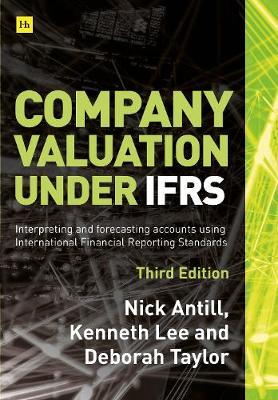Company valuation under IFRS - 3rd edition

Company valuation under IFRS - 3rd edition
Written by practitioners for practitioners, the book addresses valuation from the viewpoint of the analyst, the investor and the corporate acquirer. It starts with valuation theory: what is to be discounted and at what discount rate? It explains the connection between standard methodologies based on free cash flow and on return on capital. And it emphasizes that, whichever method is used, accurate interpretation of accounting information is critical to the production of sensible valuations. The authors argue that forecasts of cash flows imply views on profits and balance sheets, and that non-cash items contain useful information about future cash flows - so profits matter.
The book addresses the implications for analysis, modelling and valuation of key aspects of IFRS, all updated for recent developments, including:
- Pensions
- Stock options
- Derivatives
- Provisions
- Leases
- Revenue recognition
- Foreign currency
The text also sets out the key differences between IFRS and US GAAP treatments of these issues, in addition to their implications for analysis.
A detailed case study is used to provide a step-by-step valuation of an industrial company using both free cash flow and economic profit methodologies. The authors then address a range of common valuation problems, including cyclical or immature companies, as wel
PRP: 360.00 Lei
Acesta este Prețul Recomandat de Producător. Prețul de vânzare al produsului este afișat mai jos.
324.00Lei
324.00Lei
360.00 LeiLivrare in 2-4 saptamani
Descrierea produsului
Written by practitioners for practitioners, the book addresses valuation from the viewpoint of the analyst, the investor and the corporate acquirer. It starts with valuation theory: what is to be discounted and at what discount rate? It explains the connection between standard methodologies based on free cash flow and on return on capital. And it emphasizes that, whichever method is used, accurate interpretation of accounting information is critical to the production of sensible valuations. The authors argue that forecasts of cash flows imply views on profits and balance sheets, and that non-cash items contain useful information about future cash flows - so profits matter.
The book addresses the implications for analysis, modelling and valuation of key aspects of IFRS, all updated for recent developments, including:
- Pensions
- Stock options
- Derivatives
- Provisions
- Leases
- Revenue recognition
- Foreign currency
The text also sets out the key differences between IFRS and US GAAP treatments of these issues, in addition to their implications for analysis.
A detailed case study is used to provide a step-by-step valuation of an industrial company using both free cash flow and economic profit methodologies. The authors then address a range of common valuation problems, including cyclical or immature companies, as wel
Detaliile produsului













